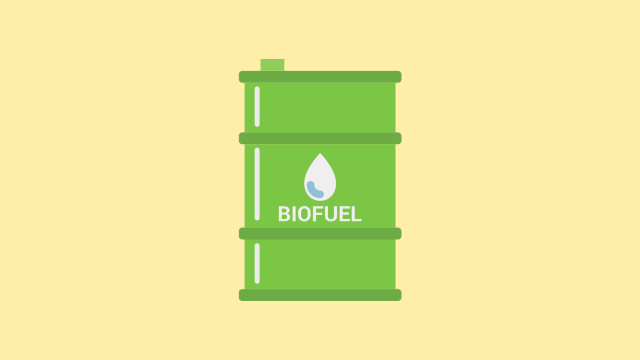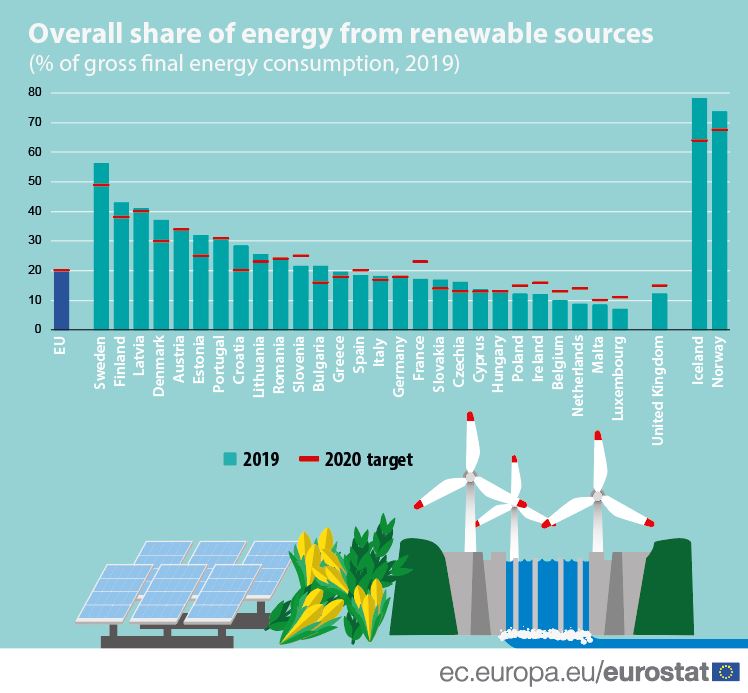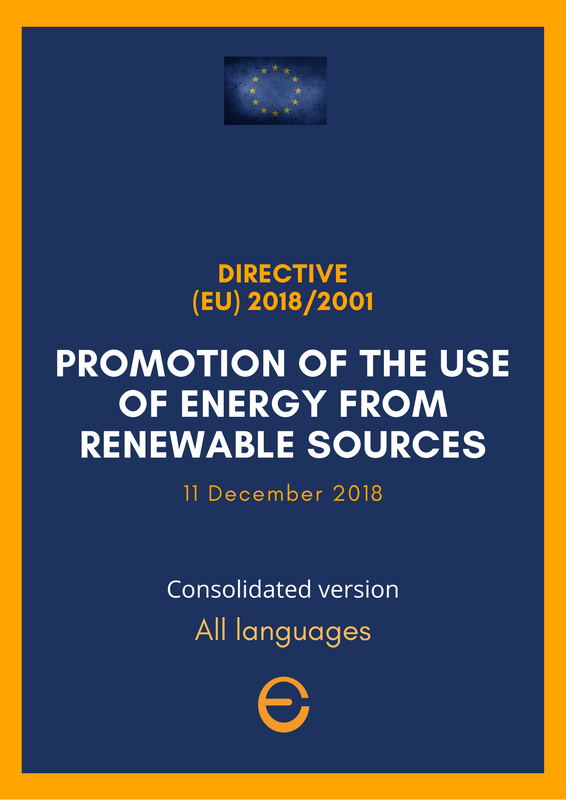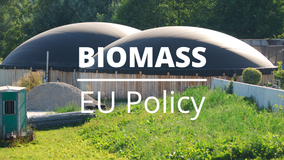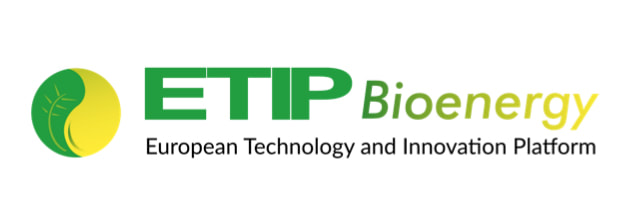Bioenergy
Bioenergy
|
Biofuels are liquid or gaseous transport fuels such as biodiesel and bioethanol which are made from biomass. They serve as a renewable alternative to fossil fuels in the EU's transport sector, helping to reduce greenhouse gas emissions and improve the EU's security of supply. By 2020, the EU planned to have 10% of the transport fuel of every EU country come from renewable sources such as biofuels and to have 20% of the consumption of energy from renewable. This first objective was quite achieved on average in Europe with 8.9%, the second with 19.7, albeit with differences from country to country. Fuel suppliers are also required to reduce the greenhouse gas intensity of the EU fuel mix by 6% by 2020 in comparison to 2010. |
Sustainability criteria
For biofuels to reduce greenhouse gas emissions without adversely affecting the environment or social sustainability, they must be produced in a sustainable way. The EU therefore sets rigorous sustainability criteria for biofuels and bioliquids.
For biofuels to reduce greenhouse gas emissions without adversely affecting the environment or social sustainability, they must be produced in a sustainable way. The EU therefore sets rigorous sustainability criteria for biofuels and bioliquids.
|
Growing biofuels on existing agricultural land can displace food production to previously non-agricultural land such as forests.
As trees absorb CO2 from the atmosphere, removing them for biofuel production may result in an increase of net greenhouse gases instead of a decrease, a process known as indirect land use change (ILUC). The recast Renewable Energy Directive (EU) 2018/2001 from December 2018 reinforces the sustainability criteria of biofuels through different provisions, including on ILUC. See the document on the side. Reports on emissions from cultivation of raw materials for use in biofuels According to Article 19 (2) of the Renewable Energy Directive (2009/28/EC), EU countries were required to submit to the Commission reports including a list of those areas on their territory classified as NUTS2 or as a more disaggregated NUTS level, where the typical greenhouse gas emissions from cultivation of agricultural raw materials could be expected to be lower than or equal to the emissions reported under the heading ‘Disaggregated default values for cultivation’ in part D of Annex V to the Directive, accompanied by a description of the method and data used to establish that list. These reports can be found here: |
Since 2015, Directive (EU) 2015/1513, which amended the Renewable Energy Directive, has made it possible for such reports to be submitted to the Commission by territories outside the EU. Also according to this Directive, the Commission may decide, by means of an implementing act adopted in accordance with the examination procedure, that reports submitted by EU countries and by countries outside the EU contain accurate data for the purposes of measuring the greenhouse gas emissions associated with the cultivation of biofuel and bioliquid feedstocks typically produced in those areas. These reports can be found here: Post-ILUC Directive NUTS2 or equivalent reports of cultivation emissions
The Implementing Acts formally recognising the above post-ILUC NUTS2 or equivalent reports of cultivation emissions can be found here:
- Recognition of report of GHG emissions from the cultivation of canola oilseed in Australia
- Recognition of report of GHG emissions from the cultivation of canola oilseed in Canada | Corrigendum
- Recognition of report of GHG emissions from the cultivation of rape oilseed in Croatia
Biofuels for aviationBiofuels can serve as a renewable alternative to jet fuel in airliners but are currently not produced on a large commercial scale for this purpose. To help spur the commercial development of biofuels for aviation, the European Commission and its partners have launched the European Advanced Biofuels Flightpath.
Quality standards for biofuelsWorking together with the European Committee for Standardisation (CEN), the EU aims to develop and improve the technical quality standards of biofuels and biofuel blends for vehicle engines. The practical work is carried out by CEN Technical Committee 19, consisting of experts from the automotive and fuel industries, biofuels producers, and other stakeholders.
European Committee for Standardisation (CEN) Technical Committee 19
Sustainability criteria
The revised Renewable Energy Directive (EU) 2018/2001, adopted in December 2018 establishes an overall policy for the promotion and use of energy from renewable sources in the European Union. The new directive reinforces the sustainability criteria of bioenergy through different provisions, including the negative direct impact that the production of biofuels may have due to indirect land use change (ILUC).
While biofuels are important in helping the EU meet its greenhouse gas reductions targets, biofuel production typically takes place on cropland that was previously used for other agriculture such as growing food or feed. Since this agricultural production is still necessary, it may lead to the extension of agriculture land into non-cropland, possibly including areas with high carbon stock such as forests, wetlands and peatlands. This process is known as indirect land use change (ILUC). As this may cause the release of CO2 stored in trees and soil, indirect land use change risks negating the greenhouse gas savings that result from increased biofuels.
In 2015 new rules came into force to reduce the risk of indirect land use change – in both the Renewable Energy Directive 2009/28/EC and the Fuel Quality Directive 2009/30/EC - and to prepare the transition towards advanced biofuels.
To address the issue of ILUC in the Clean Energy for All Europeans package, the revised renewable energy directive introduces a new approach. It sets limits on high ILUC-risk biofuels, bioliquids and biomass fuels with a significant expansion in land with high carbon stock. These limits will affect the amount of these fuels that Member States can count towards their national targets when calculating the overall national share of renewables and the share of renewables in transport. Member states will still be able to use (and import) fuels covered by these limits, but they will not be able to include these volumes when calculating the extent to which they have fulfilled their renewable targets. These limits consist of a freeze at 2019 levels for the period 2021-2023, which will gradually decrease from the end of 2023 to zero by 2030.
The directive also introduces an exemption from these limits for biofuels, bioliquids and biomass fuels certified as low ILUC-risk.
For the implementation of this approach, as required by the directive, the Commission has adopted the Delegated Regulation (EU) 2019/807, following the two-month period of scrutiny for the European Parliament and the Council as defined under the standard EU comitology procedure.
This delegated act sets out specific criteria both for:
The Commission has also adopted an accompanying report on the status of production expansion of relevant food and feed crops worldwide, based on the best available scientific data. This report provides information that member states can use in conjunction with the criteria set out in the delegated act in order to identify high ILUC-risk fuels and certify low ILUC-risk fuels.
The revised Renewable Energy Directive (EU) 2018/2001, adopted in December 2018 establishes an overall policy for the promotion and use of energy from renewable sources in the European Union. The new directive reinforces the sustainability criteria of bioenergy through different provisions, including the negative direct impact that the production of biofuels may have due to indirect land use change (ILUC).
While biofuels are important in helping the EU meet its greenhouse gas reductions targets, biofuel production typically takes place on cropland that was previously used for other agriculture such as growing food or feed. Since this agricultural production is still necessary, it may lead to the extension of agriculture land into non-cropland, possibly including areas with high carbon stock such as forests, wetlands and peatlands. This process is known as indirect land use change (ILUC). As this may cause the release of CO2 stored in trees and soil, indirect land use change risks negating the greenhouse gas savings that result from increased biofuels.
In 2015 new rules came into force to reduce the risk of indirect land use change – in both the Renewable Energy Directive 2009/28/EC and the Fuel Quality Directive 2009/30/EC - and to prepare the transition towards advanced biofuels.
To address the issue of ILUC in the Clean Energy for All Europeans package, the revised renewable energy directive introduces a new approach. It sets limits on high ILUC-risk biofuels, bioliquids and biomass fuels with a significant expansion in land with high carbon stock. These limits will affect the amount of these fuels that Member States can count towards their national targets when calculating the overall national share of renewables and the share of renewables in transport. Member states will still be able to use (and import) fuels covered by these limits, but they will not be able to include these volumes when calculating the extent to which they have fulfilled their renewable targets. These limits consist of a freeze at 2019 levels for the period 2021-2023, which will gradually decrease from the end of 2023 to zero by 2030.
The directive also introduces an exemption from these limits for biofuels, bioliquids and biomass fuels certified as low ILUC-risk.
For the implementation of this approach, as required by the directive, the Commission has adopted the Delegated Regulation (EU) 2019/807, following the two-month period of scrutiny for the European Parliament and the Council as defined under the standard EU comitology procedure.
This delegated act sets out specific criteria both for:
- determining the high ILUC-risk feedstock for which a significant expansion of the production area into land with high carbon stock is observed; and
- certifying low ILUC-risk biofuels, bioliquids and biomass fuels.
The Commission has also adopted an accompanying report on the status of production expansion of relevant food and feed crops worldwide, based on the best available scientific data. This report provides information that member states can use in conjunction with the criteria set out in the delegated act in order to identify high ILUC-risk fuels and certify low ILUC-risk fuels.
VOLUNTARY SCHEMES
Voluntary schemes help to ensure that biofuels are sustainably produced by verifying that they comply with the EU sustainability criteria. As such, the schemes check that:
While the schemes are run privately, the European Commission can recognise them as valid.
Voluntary schemes for the period after 2020
Under the recast Renewable Energy Directive (EU) 2018/2001, the EU sustainability criteria are extended to cover biomass for heating and cooling and power generation. Member States are required to transpose the new rules by 30 June 2021 and the voluntary schemes have to adjust the certification approaches to meet the new requirements.
To ensure a smooth transition to the new sustainability framework, the recognition process of voluntary schemes should start before the transposition deadline. Interested voluntary schemes are invited to apply for recognition by the Commission under the new sustainability framework. More information about the recognition process can be found in the call for interest and the updated assessment protocol.
Recognition criteria
For a scheme to be recognised by the European Commission, it must fulfil criteria such as
Approved voluntary schemes
The European Commission recognises a number of voluntary schemes that demonstrate compliance with the sustainability criteria for biofuels. Schemes may adopt their verification procedures but must notify changes that might be relevant to the Commission, such as changes in auditing procedures. The Commission assesses the changes to establish whether the schemes still adequately cover the sustainability criteria. The scheme documents on this web site, however, are not updated in order to keep a reference to the status of the schemes at the time of their recognition; updated documents are available on the scheme websites linked below.
Approved voluntary schemes▾
Voluntary schemes help to ensure that biofuels are sustainably produced by verifying that they comply with the EU sustainability criteria. As such, the schemes check that:
While the schemes are run privately, the European Commission can recognise them as valid.
Voluntary schemes for the period after 2020
Under the recast Renewable Energy Directive (EU) 2018/2001, the EU sustainability criteria are extended to cover biomass for heating and cooling and power generation. Member States are required to transpose the new rules by 30 June 2021 and the voluntary schemes have to adjust the certification approaches to meet the new requirements.
To ensure a smooth transition to the new sustainability framework, the recognition process of voluntary schemes should start before the transposition deadline. Interested voluntary schemes are invited to apply for recognition by the Commission under the new sustainability framework. More information about the recognition process can be found in the call for interest and the updated assessment protocol.
Recognition criteria
For a scheme to be recognised by the European Commission, it must fulfil criteria such as
Recognition for a voluntary scheme can last for a period of five years.
Approved voluntary schemes
The European Commission recognises a number of voluntary schemes that demonstrate compliance with the sustainability criteria for biofuels. Schemes may adopt their verification procedures but must notify changes that might be relevant to the Commission, such as changes in auditing procedures. The Commission assesses the changes to establish whether the schemes still adequately cover the sustainability criteria. The scheme documents on this web site, however, are not updated in order to keep a reference to the status of the schemes at the time of their recognition; updated documents are available on the scheme websites linked below.
Approved voluntary schemes▾
Voluntary scheme reports
Review of voluntary scheme annual reports
2019
2018
2017
Approved national schemes
The European Commission also recognises national biofuel sustainability schemes that have been notified to the Commission by EU governments.
Austrian Agricultural Certification Scheme
Voluntary schemes help to ensure that biofuels are sustainably produced by verifying that they comply with the EU sustainability criteria. As such, the schemes check that:
- production of biofuel feedstock does not take place on land with high biodiversity
- land with a high amount of carbon has not been converted for biofuel feedstock production
- biofuel production leads to sufficient greenhouse gas emissions savings
While the schemes are run privately, the European Commission can recognise them as valid.
Voluntary schemes for the period after 2020
Under the recast Renewable Energy Directive (EU) 2018/2001, the EU sustainability criteria are extended to cover biomass for heating and cooling and power generation. Member States are required to transpose the new rules by 30 June 2021 and the voluntary schemes have to adjust the certification approaches to meet the new requirements.
To ensure a smooth transition to the new sustainability framework, the recognition process of voluntary schemes should start before the transposition deadline. Interested voluntary schemes are invited to apply for recognition by the Commission under the new sustainability framework. More information about the recognition process can be found in the call for interest and the updated assessment protocol.
Recognition criteria
For a scheme to be recognised by the European Commission, it must fulfil criteria such as
- feedstock producers comply with the sustainability criteria
- information on the sustainability characteristics can be traced to the origin of the feedstock
- all information is well documented
- companies are audited before they start to participate in the scheme and retroactive audits take place regularly
- the auditors have both the generic and specific auditing skills needed with regards to the scheme's criteria
Approved voluntary schemes
The European Commission recognises a number of voluntary schemes that demonstrate compliance with the sustainability criteria for biofuels. Schemes may adopt their verification procedures but must notify changes that might be relevant to the Commission, such as changes in auditing procedures. The Commission assesses the changes to establish whether the schemes still adequately cover the sustainability criteria. The scheme documents on this web site, however, are not updated in order to keep a reference to the status of the schemes at the time of their recognition; updated documents are available on the scheme websites linked below.
Approved voluntary schemes▾
Voluntary schemes help to ensure that biofuels are sustainably produced by verifying that they comply with the EU sustainability criteria. As such, the schemes check that:
- production of biofuel feedstock does not take place on land with high biodiversity
- land with a high amount of carbon has not been converted for biofuel feedstock production
- biofuel production leads to sufficient greenhouse gas emissions savings
While the schemes are run privately, the European Commission can recognise them as valid.
Voluntary schemes for the period after 2020
Under the recast Renewable Energy Directive (EU) 2018/2001, the EU sustainability criteria are extended to cover biomass for heating and cooling and power generation. Member States are required to transpose the new rules by 30 June 2021 and the voluntary schemes have to adjust the certification approaches to meet the new requirements.
To ensure a smooth transition to the new sustainability framework, the recognition process of voluntary schemes should start before the transposition deadline. Interested voluntary schemes are invited to apply for recognition by the Commission under the new sustainability framework. More information about the recognition process can be found in the call for interest and the updated assessment protocol.
Recognition criteria
For a scheme to be recognised by the European Commission, it must fulfil criteria such as
- feedstock producers comply with the sustainability criteria
- information on the sustainability characteristics can be traced to the origin of the feedstock
- all information is well documented
- companies are audited before they start to participate in the scheme and retroactive audits take place regularly
- the auditors have both the generic and specific auditing skills needed with regards to the scheme's criteria
Recognition for a voluntary scheme can last for a period of five years.
Approved voluntary schemes
The European Commission recognises a number of voluntary schemes that demonstrate compliance with the sustainability criteria for biofuels. Schemes may adopt their verification procedures but must notify changes that might be relevant to the Commission, such as changes in auditing procedures. The Commission assesses the changes to establish whether the schemes still adequately cover the sustainability criteria. The scheme documents on this web site, however, are not updated in order to keep a reference to the status of the schemes at the time of their recognition; updated documents are available on the scheme websites linked below.
Approved voluntary schemes▾
Voluntary scheme reports
Review of voluntary scheme annual reports
2019
2018
2017
Approved national schemes
The European Commission also recognises national biofuel sustainability schemes that have been notified to the Commission by EU governments.
Austrian Agricultural Certification Scheme
Biofuels for Aviation
Direct emissions from civil aviation account for about 3% of total greenhouse gas emissions in the EU. Biofuels can help lower the EU's carbon footprint by providing a renewable alternative to jet fuel in airliners. They emit less CO2, contain no sulphur compounds, and are generally more efficient due to their higher energy density.
European Advanced Biofuels FlightpathThe European Advanced Biofuels Flightpath aims:
To achieve this, the Flightpath will find ways to finance these plants. The first steps include:
In 2011, the European Commission in partnership with Airbus, and in cooperation with leading European Airlines (Lufthansa, Air France/KLM, and British Airways) and biofuel producers (Choren Industries, Neste Oils, Biomass Technology Group, and UOP) launched the European Advanced Biofuels Flightpath.
Related documents on advanced biofuels flightpath:
Direct emissions from civil aviation account for about 3% of total greenhouse gas emissions in the EU. Biofuels can help lower the EU's carbon footprint by providing a renewable alternative to jet fuel in airliners. They emit less CO2, contain no sulphur compounds, and are generally more efficient due to their higher energy density.
European Advanced Biofuels FlightpathThe European Advanced Biofuels Flightpath aims:
- to get sustainably produced biofuels to the market faster, through the construction of advanced biofuels production plants in Europe. The first set of plants are planned to be operational by 2015 or 2016, with the second set operational by 2020
- to get the aviation industry to use 2 million tonnes of biofuels by 2020
To achieve this, the Flightpath will find ways to finance these plants. The first steps include:
- hosting a high level workshop with financial institutions to address potential funding
- facilitating the signing of purchase agreements between the aviation sector and biofuel producers
In 2011, the European Commission in partnership with Airbus, and in cooperation with leading European Airlines (Lufthansa, Air France/KLM, and British Airways) and biofuel producers (Choren Industries, Neste Oils, Biomass Technology Group, and UOP) launched the European Advanced Biofuels Flightpath.
Related documents on advanced biofuels flightpath:


